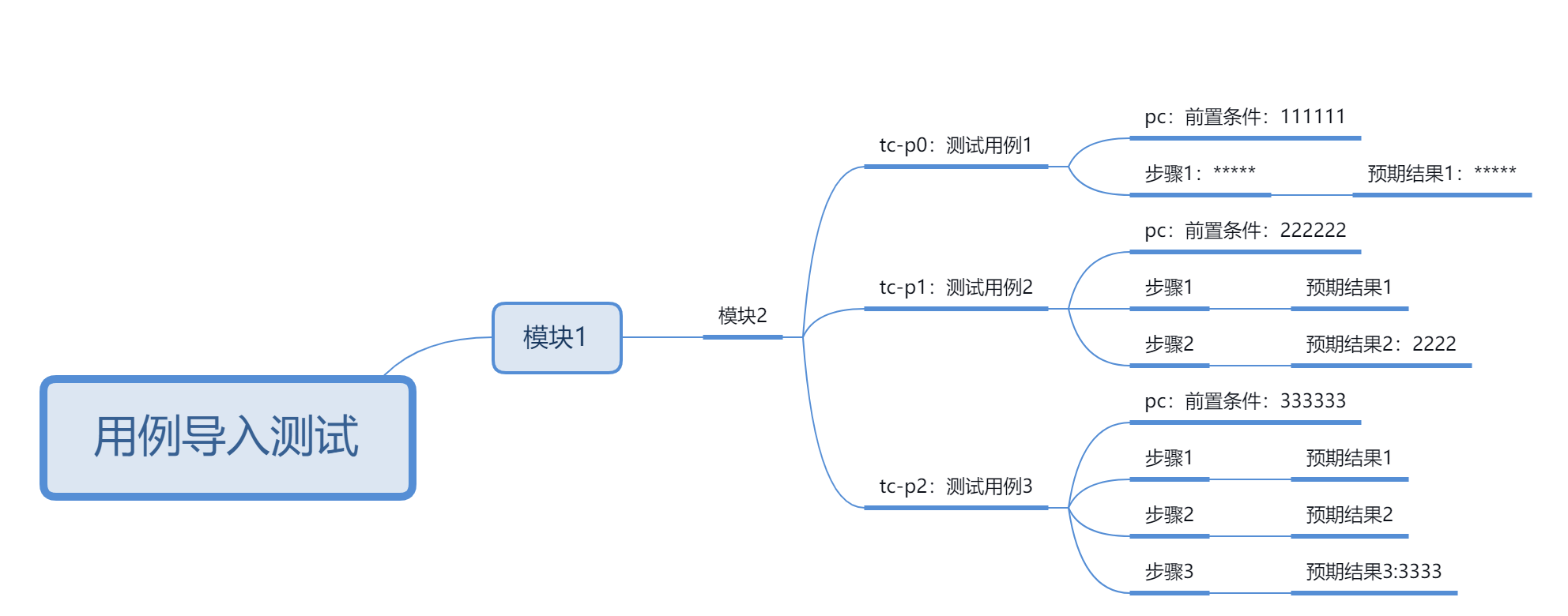python将Xmind用例转为Excel用例

代码:
# coding=utf-8 import xlwt from past.builtins import raw_input from xmindparser import xmind_to_dict def resolvePath(dict, lists, title): # title去除首尾空格 title = title.strip() # 如果title是空字符串,则直接获取value if len(title) == 0: concatTitle = dict['title'].strip() else: concatTitle = title + '\t' + dict['title'].strip() if dict.__contains__('topics') == False: lists.append(concatTitle) else: for d in dict['topics']: resolvePath(d, lists, concatTitle) def xmind_cat(list, excelname, groupname): f = xlwt.Workbook() sheet = f.add_sheet(groupname, cell_overwrite_ok=True) row0 = ["功能模块", "用例名称", "前置条件", "执行方式", "优先级", "测试步骤", "预期结果"] # 生成第一行中固定表头内容 for i in range(0, len(row0)): sheet.write(0, i, row0[i]) # 增量索引 index = 0 # case级别 case_leve_index = "" # 前置条件/用例名称 case_pre_condition = [] pre_num = 0 for h in range(0, len(list)): #print("list:",list) lists = [] resolvePath(list[h], lists, '') for j in range(0, len(lists)): # 将xmind转成excel lists[j] = lists[j].split('\t') # print(lists[j]) try: # print(index) if "pc:前置条件" in lists[j][-1]: # print(lists[j][-1]) case_pre_condition.append(lists[j]) # print(case_pre_condition) pre_num += 1 else: case_leve = "" for n in range(len(lists[j])): if 'tc-p' in str(lists[j][n]): case_leve_index = n - 1 if "tc-p0" in str(lists[j][n]): case_leve = "p0" elif "tc-p1" in str(lists[j][n]): case_leve = "p1" elif "tc-p2" in str(lists[j][n]): case_leve = "p2" lists[j].pop(n) break module_name = "/"+"/".join(lists[j][:case_leve_index + 1]) sheet.write(j + index + 1 - pre_num, 0, module_name) # 功能模块 if len(lists[j][case_leve_index:-1]) < 2: sheet.write(j + index + 1 - pre_num, 6, lists[j][case_leve_index + 1]) # 期望结果 else: sheet.write(j + index + 1 - pre_num, 5, lists[j][case_leve_index + 1]) # 操作步骤 sheet.write(j + index + 1 - pre_num, 6, lists[j][case_leve_index + 2]) # 期望结果 sheet.write(j + index + 1 - pre_num, 3, "手动") # 执行方式 sheet.write(j + index + 1 - pre_num, 4, case_leve) # 用例名称 if len(case_pre_condition) > 0: for pre_list in case_pre_condition: if set(pre_list[:-2]) < set(lists[j]): # print(pre_list[-2][6:]) sheet.write(j + index + 1 - pre_num, 1, pre_list[-2][6:]) # 预置条件 if len(case_pre_condition) > 0: # print(case_pre_condition) for pre_list in case_pre_condition: if set(pre_list[:-2]) < set(lists[j]): # print(pre_list[-1][3:]) sheet.write(j + index + 1 - pre_num, 2, pre_list[-1][3:]) except: print("请检查编写的用例是否符合规范:", lists[j]) # 遍历结束lists,给增量索引赋值,跳出for j循环,开始for h循环 if j == len(lists) - 1: index += len(lists) f.save(excelname) def maintest(filename, excelname): out = xmind_to_dict(filename) groupname = out[0]['topic']['title'] xmind_cat(out[0]['topic']['topics'], excelname, groupname) if __name__ == '__main__': try: # path = raw_input("请输入Xmind用例文件路径,可将文件拖拽到此处:") path = r"D:\download\PythonTools-master\PythonTools-master\xmind_to_excel\用例模版.xmind" filename = path excelname = path.rstrip('xmind') + 'xlsx' maintest(filename, excelname) print('SUCCESS!\n生成用例成功,用例目录:%s' % excelname) except: print( '请确认后重试:\n1.用例文件路径中不能有空格换行符\n2.请使用python3运行\n3.检查xmind文件中不能有乱码或无法识别的字符(xmind自带表情字符除外)\n4.检查是否将已生成的excel文件未关闭')
效果:




 浙公网安备 33010602011771号
浙公网安备 33010602011771号